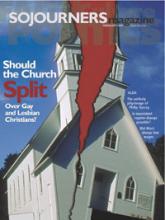When I want to see live gospel stories, I go to the Amoco station at 14th and Euclid in my Washington, D.C. neighborhood.
One Saturday morning I stopped at the gas station for a cup of coffee. I was standing at the front door lowering my lips to a steaming Styrofoam cup when the Wonder Bread truck pulled up to unload the weekend deliveries. The driver opened the cargo bay doors and began off-loading flats of bread.
Across the parking lot, a woman in her late 40s saw the truck full of bread and made directly for it. She was thin. Her clothes were not clean. Her face was drawn with cold.
The driver seemed nervous to leave her standing next to his open bay doors as he wheeled the deliveries into the store. He glanced at me as if to say, "Keep an eye on things." She did indeed appear to be weighing whether she could grab a couple of loaves and run. She didn’t.
When the driver returned, she asked him very politely, but with a certain level of desperation, if she could have some bread.
"Sister," he said, "it’s not mine to give." She asked again, for just one loaf. With some anguish, he turned his back on her, saying again, "It’s not mine to give." She walked away.
The driver looked at me, embarrassed. He seemed genuinely ashamed that he didn’t give bread to a sister in need.
The driver was correct in saying that the bread was not his to give. There are inventories to be filled and every item must be accounted for, lest he be accused of stealing. In one sense, the bread is "owned" by Interstate Bakeries Corp. In another sense, a more human sense, bread is to be shared.
In the crisp morning air, Jesus’ question in Luke’s gospel was stretched like a spiritual tension wire between the delivery driver and myself—Who among you, when your child asks for bread, would give a stone?
Read the Full Article
